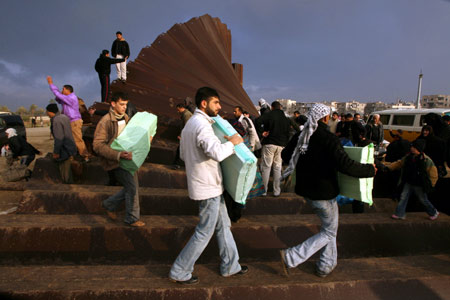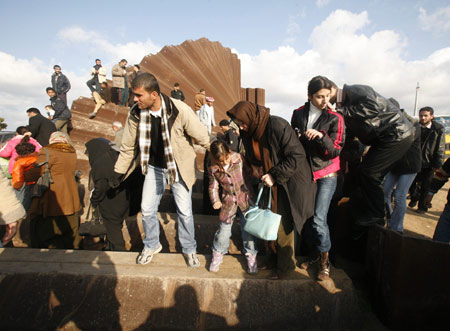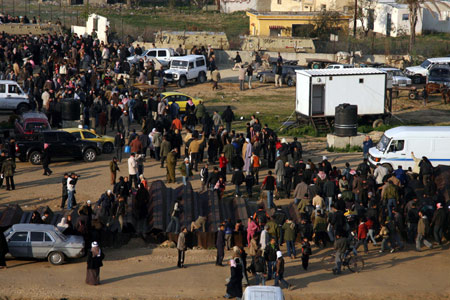Palestinians return to Gaza after buying daily supplies in Egypt, through the Rafah border between the southern Gaza Strip and Egypt, January 23, 2008. Thousands of Gazans poured into Egypt to buy daily necessities Wednesday after masked Palestinian militants set off at least five explosions along the walled-off border earlier in the day.
Carrying a goat and jumping over a fence on the borders between southern Gaza Strip and Egypt, Suleiman Abdullah said this was the only way to the outside world in more than seven months of Israeli closure imposed on the strip.
"We are witnessing a slow death after more than seven months of closure, and I believe that we have no other choice," said Abdullah, as he put the goat in a mini-truck waiting outside Egypt borders.
He went back again to the Egyptian part of Rafah town to bring more goats and sheep.
Each sheep costs 120 US dollars, he said, adding that "in Gaza we sell it for 200 dollars."
The 24-year-old young man is among tens of thousands of Gazans who poured into Egypt on Wednesday, after dozens of Palestinian militants blew down most of the border fences between the two territories.
Palestinians make their way to Egypt after Palestinian gunmen blew up a section of the border wall between the Gaza Strip and Egypt January 23, 2008.
Witnesses said they also saw bulldozers removing barbed wires on the borders as well as rubbles of the cement and blocks of the fences near the Rafah crossing, the only gateway for the Gazans to the outside world bypassing Israel.
On the roads from Gaza City and other areas, hundreds of trucks, buses and cars full of jubilant Gazans were seen heading to the southern Gaza Strip and then to Egypt to exploit the rare chance to escape Gaza's isolation.
Hundreds of thousands parked their cars and vehicles in the Gaza segment of Rafah and then walked a distance of about 800 meters to cross the hole.
At the hole, dozens of people were seen squeezing and pushing each other until they got out of it. They have to walk another 80 meters to a barbed wire and then jump over a short wall, and finally they are in Egypt.
Abdullah added that "the best way to break the siege is by force. Israel closed down all crossings, and the people found it as an opportunity to get to Egypt and buy what they need."
The border wall tear-down came after Israel's decision on Monday to slightly ease the blockade against the Hamas-run Gaza Strip, which is home to nearly 1.5 million residents heavily depending on outside aid inflow of almost everything, from basic foodstuffs to medicine.
After Islamic Hamas movement chased out security forces loyal to President Mahmoud Abbas and took control of the Gaza Strip in mid June last year, Israel closed down Gaza crossings and labeled the coastal enclave a hostile entity.
Palestinians walk across the wall of Rafah border between the southern Gaza Strip and Egypt to pour into the Egyptian side to buy food, fuel and other supplies, January 23, 2008.
Over the past seven months, Israel has just allowed some basic food into Gaza, including rice, sugar, cocking batter, flour, fruits, diary products and frozen meat.
On January 17, Israel decided to tighten the siege on Gaza and close all crossings leading to Gaza. Since then, Israel has been barring fuels and basic food products from reaching the Gaza Strip, in retaliation to ongoing makeshift rocket attacks carried out by Palestinian militants from Gaza against Israel.
Mufida Abu Zarqa, a 52-year-old mother from Gaza was seen walking with her three daughters and getting into the hole. After she managed to enter through it, she said she wants to go to Egypt to visit her ill sister.
"In addition to visiting my ill sister in Egypt, I want to buy some staff when I come back to Gaza," she said, adding that "over the past seven months of closure, we lack many kinds of products, such as food, fuel and cigarettes."
Witnesses said that around 400,000 Palestinians crossed through the destroyed borders between the Gaza Strip and Egypt. Many brought back boxes of cloth washing powders, or boxes of dry dates.
Sami Hamdan, a resident of Khan Younis city, seven kilometers north of Rafah town, said he went to Egypt to buy some staff which he could sell then in the city to make money.
"I own a store in Khan Younis, but most of the goods in my store had run out and I went to bring staff that I still don't have in my store," said Hamdan as he and two of his sons were carrying boxes full of clothes washing powder.
"We go to Egypt to buy goods and staff with cheap price, and we sell it in Gaza with higher prices. We make money in order to live in such harsh living circumstances," said Jamil Safi as he was pulling a mother sheep and its son.
It was the second time in two years that Palestinians destroy the fence wall at the borders with Egypt. In September 2005 after Israel pulled out from the Gaza Strip, thousands Gazans crossed into Egypt.
Egyptian President Hosni Mubarak said earlier in the day that he ordered the Egyptian security forces at the Rafah crossing to allow Palestinians to cross the terminal to buy their basic needs.
In response to the borders breach, Israel threatened to bar again fuels for operating Gaza power station and basic food supplies into Gaza.
Deposed Prime Minister of Hamas in Gaza Ismail Haneya proposed to hold a three-way meeting that include Egyptian President Hosni Mubarak and President Mahmoud Abbas and Hamas government to discuss the opening of Gaza crossings.
The Hamas government said in a statement that the only way to resolve the problem "is by holding dialogue and looking for a proper way to end the crisis and break the Israeli siege."
Fatah movement and President Mahmoud Abbas accused Hamas movement in Gaza for creating the crisis by blowing down the 6-meter-high and nine-km-long fence wall and creating holes to let people cross into Egypt.
(Xinhua News Agency January 24, 2008)




